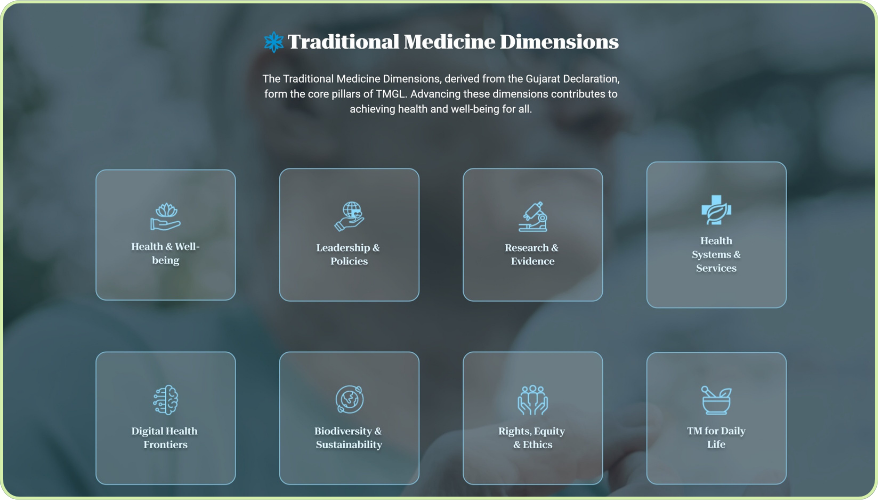The World Health Organization’s (WHO) Traditional Medicine Global Library (TMGL) development project reached a significant milestone in November 2024, with the delivery of its first functional version. Developed by BIREME in just three months, the preliminary “alpha” version represents a strategic advance in knowledge management and democratization of access to information on traditional, complementary and integrative medicines (TCIM).
The development of the TMGL adopted a staged approach, based on agile methodologies, making it the first BIREME project to make full use of this management model. “In approximately three months, we were able to deliver a functional version that is already being tested by selected users, representing an important milestone in the evolution of the project,” affirmed João Paulo Souza, Director of BIREME. This approach allowed for the rapid and iterative development of functionalities, with continuous cycles of testing and refinement, guaranteeing efficiency and alignment with the needs of the end users, highlighted the Director.

Substantial functionalities and numbers
The alpha version of TMGL brings together 1.7 million records, including more than 1 million full-text documents from databases such as Medline, LILACS and other international repositories. The library currently integrates 112 databases, 132 specialized journals and innovative resources that facilitate the retrieval and use of information.
Among the features already available on the TMGL global portal are:
Browse Resources: A user-friendly interface organizes resources into categories such as evidence maps, databases, journals, recent literature reviews and news. Evidence maps, for example, offer a dynamic and interactive visualization of data from systematic reviews, allowing users to easily navigate complex scientific findings, with easy visualization of tested and effective interventions, and including current knowledge gaps.
Regions & Countries navigation: The platform’s architecture structures and makes information available by geographical location, offering users an interactive map for navigating WHO Regions. This will make it possible to access customized content for specific regions, such as Africa, the Americas, Europe and others, promoting a localized experience that is more appropriate for cultural contexts. In the current preliminary version, the features of the “Global” section are minimally functional.
Advanced Search (Search Collection): A robust integrated search tool (iAHx) offers complete search experience, with filters that allow results to be refined by full text, regions and documentary categories. This functionality supports users in browsing more than 1.7 million records and offers options for exporting and sending results, making it easier to retrieve the most relevant and appropriate information.
The Product Manager of the project at BIREME, librarian Mirelys explains that the aim is to guarantee multiple and variable access routes to the knowledge sought by users. “Each dimension or resource contributes to consolidating the library as a comprehensive source of information on traditional, complementary and integrative medicines, offering different access points to users,” she emphasized.
In the Homepage of the global portal’s test environment, other resources already available and/or planned for delivery in the second preliminary version include:
- Thematic sections dedicated to the “Dimensions of Traditional Medicine”: Inspired by the Gujarat Declaration, the “Dimensions of Traditional Medicine” structure the content in areas such as “health and well-being”, “policies and leadership”, “evidence and research”, “sustainability and biodiversity”, “rights, equity and ethics”, and “traditional medicines for everyday life”, among others.
- Recent literature reviews: A section dedicated to presenting the most recent and relevant reviews by region, integrated intuitively into the portal interface, and promoting the dissemination of up-to-date studies on topics of interest in the field.
- Featured stories and events: The library will also offer a section with featured stories and a calendar of events, promoting the dissemination of information and global updates in the field of traditional medicines.

Next steps and global impact
With the next milestone in the project’s development, TMGL will be consolidated as a global strategic tool for accessing information on traditional medicine. The delivery of the beta version, scheduled for April 2025, will bring advanced functionalities such as profiles by region and country, as well as evidence maps and thematic repositories. The final launch is scheduled for November 2025, during the Second Global Summit on Traditional Medicine, organized by the WHO, to be held in India.
The development and operation of TMGL is coordinated by a multidisciplinary editorial team from BIREME, led by João Paulo Souza, Director of the Center and Editor-in-Chief of the library. Mirelys Puerta Díaz, Senior Librarian and Product Manager of TMGL, coordinates the efforts together with Verônica Abdala, Head of Library and leader of BIREME’s Information Products and Services team. The team also includes specialists in the areas of TCIM and public health, such as Natalia Sofía Aldana Martinez, technology and design, by Marcos Mori, leader of the development area, and Julio Takayama, responsible for user experience (UX) design. Complementing the team are Márcio da Silva, Marco Miacci and Márcia Barreto, who work on web design development and the project’s IT infrastructure, ensuring the platform’s robustness and functionality.
According to João Paulo Souza, Director of BIREME, “This synergy between specialists reflects BIREME’s commitment to the excellence of TMGL as an innovative global resource, and the result of this effort is reflected in the delivery of the minimally functional version in such a short period of time”.